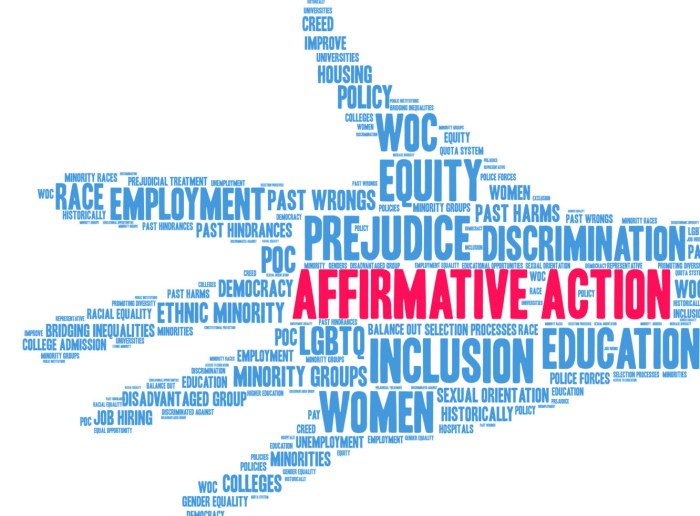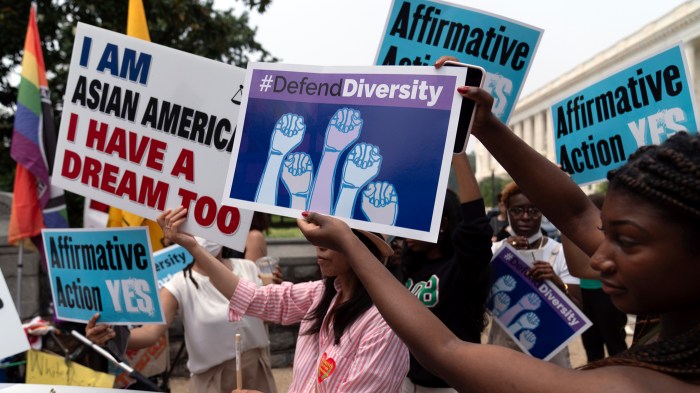Affirmative action is synonymous for reverse discrimination. This contentious policy, designed to rectify historical inequities, has sparked a heated debate about its merits and consequences. This discourse delves into the intricate arguments for and against affirmative action, examining its potential to promote diversity and combat discrimination while also considering concerns about fairness and meritocracy.
Affirmative Action and Reverse Discrimination: Historical Context

Affirmative action emerged as a response to persistent racial discrimination in the United States.
Key Legislation and Court Cases, Affirmative action is synonymous for reverse discrimination.
- Civil Rights Act of 1964
- Equal Employment Opportunity Act of 1972
- University of California v. Bakke (1978)
Arguments for and Against Reverse Discrimination
Critics argue that affirmative action leads to reverse discrimination, where qualified individuals are denied opportunities in favor of less qualified individuals from underrepresented groups.
Defining Affirmative Action and Reverse Discrimination
Affirmative action refers to policies designed to promote diversity and equal opportunity by giving preference to underrepresented groups in areas such as education and employment.
Legal and Social Implications
Affirmative action policies can have legal implications, such as constitutional challenges and lawsuits alleging reverse discrimination.
Examples
- Preferential admission policies in universities
- Set-asides for minority-owned businesses in government contracts
- Reverse discrimination lawsuits against employers who allegedly discriminated against white males
Arguments for Affirmative Action

Promoting Diversity and Equal Opportunity
Affirmative action aims to increase the representation of underrepresented groups in various fields, fostering a more diverse and inclusive society.
Addressing Historical Discrimination
Affirmative action is seen as a way to rectify past discrimination and level the playing field for individuals from marginalized communities.
Arguments Against Affirmative Action
Reverse Discrimination
Critics argue that affirmative action can lead to reverse discrimination, where qualified individuals are denied opportunities due to their race or gender.
Lowering Standards
Some argue that affirmative action can lead to a lowering of standards, as less qualified individuals may be admitted to universities or hired for jobs based on their group membership rather than their merit.
Current Legal Landscape of Affirmative Action: Affirmative Action Is Synonymous For Reverse Discrimination.

| Jurisdiction | Legal Status |
|---|---|
| United States | Legal at the federal level, with varying state laws |
| United Kingdom | Limited use, with a focus on promoting equality rather than remedying past discrimination |
| Canada | Legal, with a focus on promoting diversity and addressing systemic barriers |
General Inquiries
What is the primary goal of affirmative action?
Affirmative action aims to redress historical patterns of discrimination and create a more equitable society by providing opportunities and support to underrepresented groups.
How does affirmative action differ from reverse discrimination?
While both policies seek to address discrimination, affirmative action focuses on providing opportunities to disadvantaged groups, while reverse discrimination involves giving preferential treatment to members of these groups over more qualified candidates.
What are the main arguments in favor of affirmative action?
Proponents argue that affirmative action promotes diversity, enhances representation, and helps to level the playing field for groups that have historically faced barriers to success.
What are the main arguments against affirmative action?
Opponents contend that affirmative action can lead to reverse discrimination, lower standards, and create a sense of entitlement among beneficiaries.